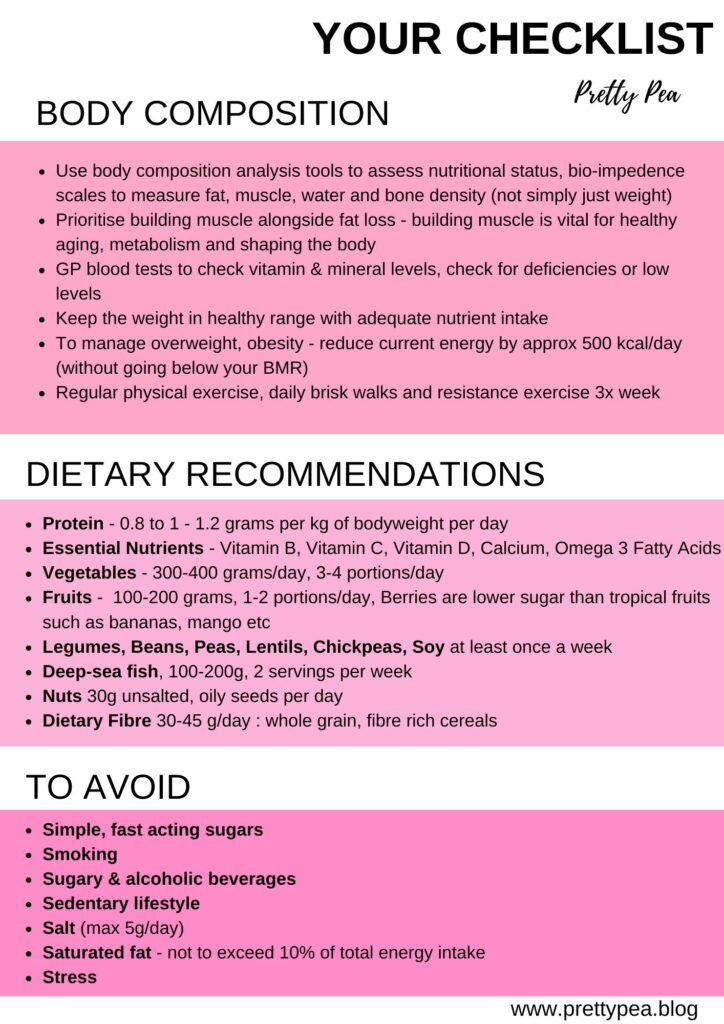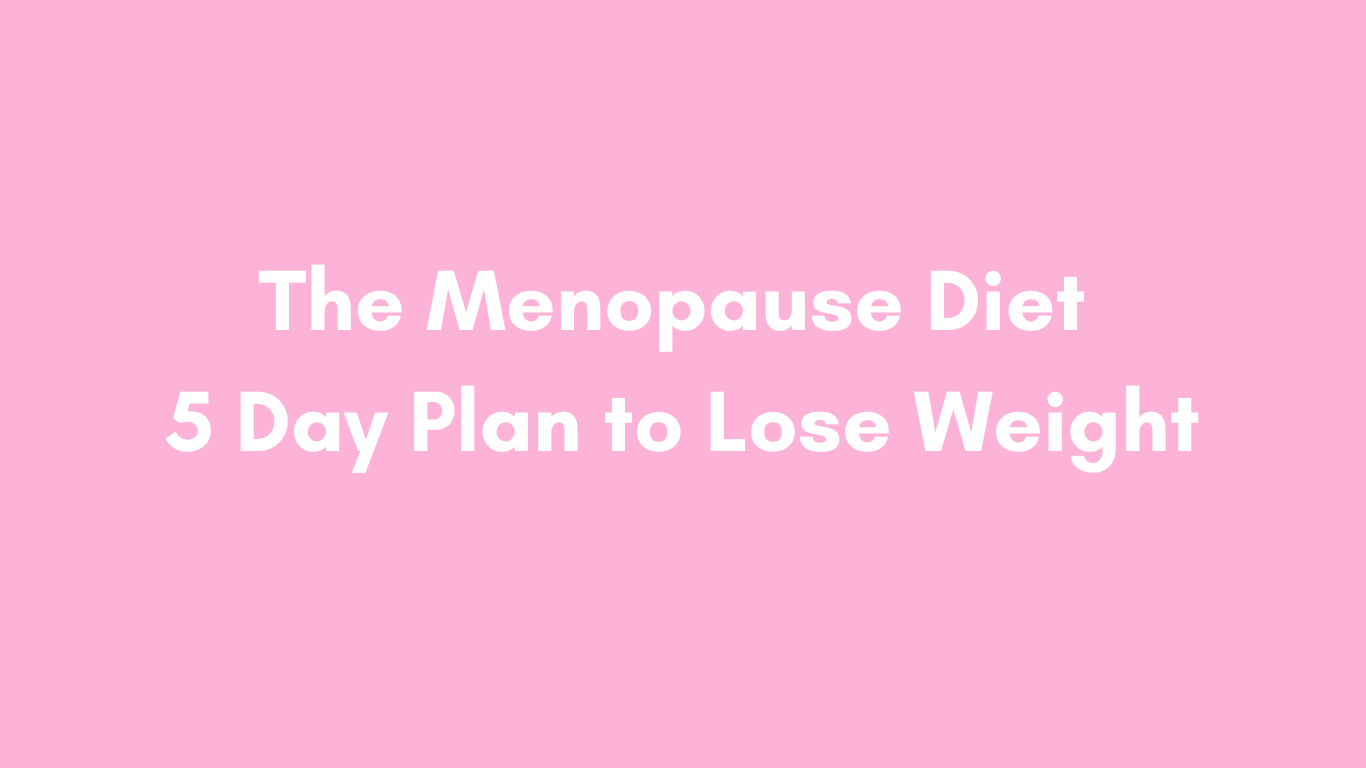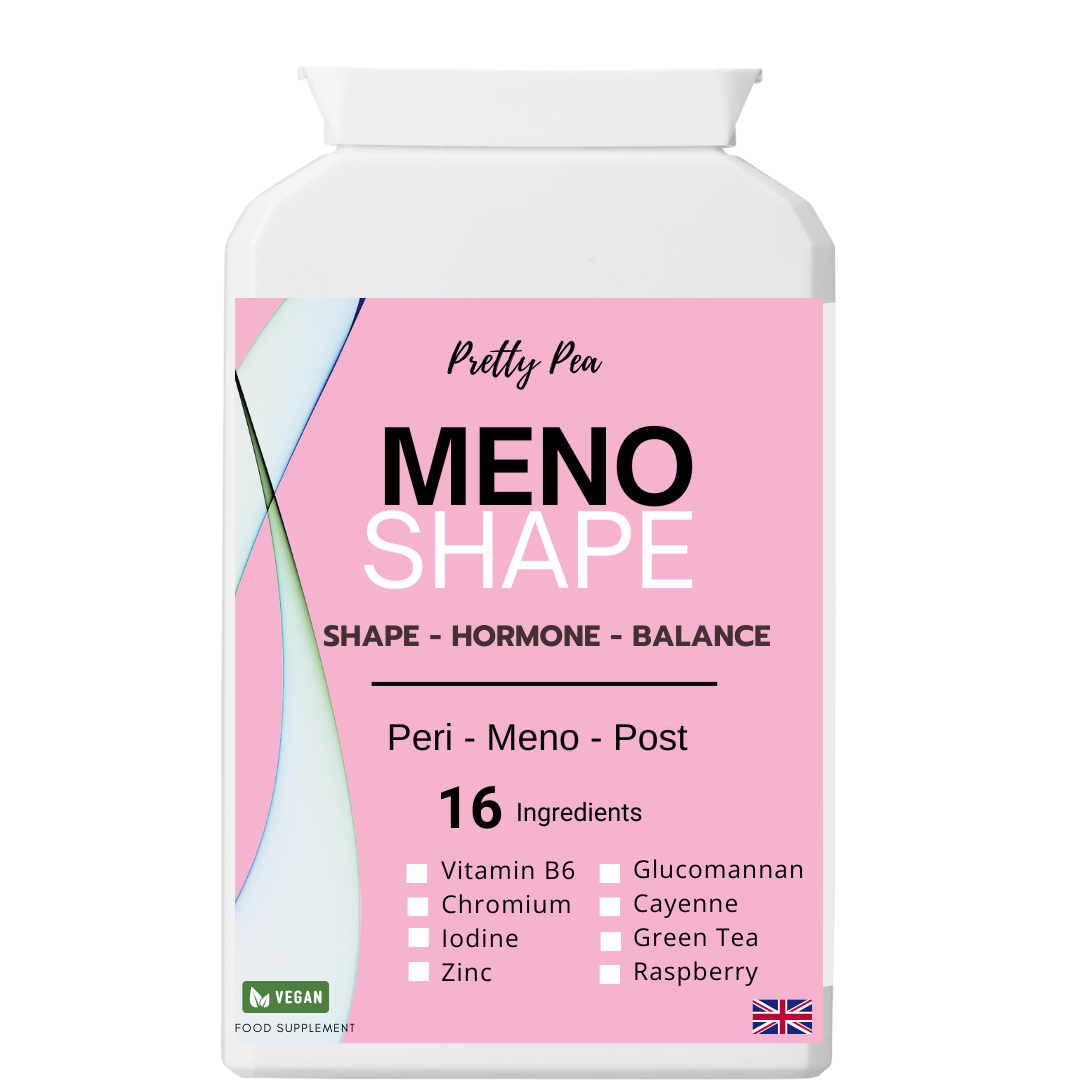- Understanding Menopause and Weight Gain
- Key Principles of the Menopause Diet 5 Day Plan to Lose Weight
- Focus on Protein: The Muscle Preserver
- Healthy Fats – The Hormone Helpers
- Fibre – Your Gut Guardian
- Hydration – The Metabolism Mover
- Sugar – The Fat Trigger
- Phytoestrogens – The Natural Estrogen Boosters
- Calorie Control – The Energy Equation
- Menopause Diet 5 Day Plan to Lose Weight
- The Menopause Diet 5 Day Plan to Lose Weight – Supplements
The Menopause Diet 5 Day Plan to Lose Weight : Up to 70% of women experience weight gain during perimenopause and menopause. Hormone imbalance at menopause, particularly the decline in estrogen levels, can result in increased abdominal fat, reduced muscle mass, and challenges in maintaining a healthy weight. Fortunately, adopting a targeted approach to nutrition can help manage weight and promote overall well-being. Enter the Menopause Diet 5 Day Plan to Lose Weight, a simple yet effective guide and checklist to help you achieve your menopause health goals. In this article we share delicious recipes that include the nutritious food a changing body needs and explain why.
Understanding Menopause and Weight Gain
During menopause, hormonal shifts, particularly the decline in estrogen levels, can lead to changes in metabolism and fat distribution. This often results in increased abdominal fat, reduced muscle mass, and challenges in maintaining a healthy weight. Additionally, menopause can affect insulin sensitivity and increase cravings, making it more difficult to stick to a balanced diet.
To counter a changing body means making some changes, starting with choosing nutrient-dense, balanced meals tailored to your changing needs.
Key Principles of the Menopause Diet 5 Day Plan to Lose Weight
Focus on Protein: The Muscle Preserver
The Menopause Diet 5 Day Plan to Lose Weight: Why it matters:
During menopause, women naturally lose muscle mass due to declining estrogen and age. Less muscle = slower metabolism = easier weight gain, especially around the middle. By incorporating lean protein sources such as chicken, fish, tofu, and legumes, you can support muscle maintenance and boost your metabolism.
How it helps weight loss:
Protein plays a crucial role in preserving muscle mass, it boosts metabolism, and helps you feel fuller for longer. This makes it easier to maintain a calorie deficit without feeling deprived.
What’s happening in the body:
Protein takes more energy to digest (known as the thermic effect/thermogenic), and it slows stomach emptying, helping you stay full. It also reduces cravings by regulating hunger hormones like ghrelin.
Study facts:
A 2015 study in The American Journal of Clinical Nutrition1 found that higher protein intake (1.2g/kg of body weight) preserved lean mass during weight loss in postmenopausal women better than lower-protein diets.
Healthy Fats – The Hormone Helpers
The Menopause Diet 5 Day Plan to Lose Weight: Why it matters:
Fat isn’t the enemy — it’s essential for hormone production, brain health, and satiety. During menopause, your body relies more on dietary fat as estrogen naturally declines. Healthy fats, particularly omega-3 fatty acids found in salmon, walnuts, chia seeds, and flaxseeds, are essential for reducing inflammation and supporting heart health (womens risk increases post menopause). These fats can also aid in hormone regulation, which is particularly beneficial for managing menopausal symptoms and preventing weight gain
How it helps weight loss:
Healthy fats help balance hormones and keep you feeling full, reducing the need to snack or overeat. They also reduce inflammation, which is often higher during menopause and linked to weight gain.
What’s happening in the body:
Fats slow digestion and provide essential building blocks for hormones. Omega-3 fatty acids, in particular, support brain function and reduce belly fat accumulation.
Study facts:
A 2010 review in The Journal of Nutrition2 found that diets rich in monounsaturated fats (like olive oil and avocado) led to more abdominal fat loss compared to low-fat diets.
Fibre – Your Gut Guardian
The Menopause Diet 5 Day Plan to Lose Weight: Why it matters:
Menopause can slow digestion and increase bloating. Complex carbohydrates such as whole grains, legumes, and vegetables provide a steady release of energy and are rich in fibre. Fibre keeps things moving and supports a healthy gut microbiome — which influences weight and hormones.
How it helps weight loss:
Fibre reduces appetite, regulates blood sugar, and improves insulin sensitivity — key for reducing belly fat. It also feeds good gut bacteria, which play a role in weight regulation.
What’s happening in the body:
Soluble fibre (psyllium husk, glucomannan) forms a gel in your gut, slowing digestion and the release of glucose. They provide a steady release of energy. This reduces insulin spikes (which can promote fat storage). Insoluble fibre adds bulk and keeps bowels regular.
Study facts:
A 2015 study in Annals of Internal Medicine3 showed that simply increasing fibre intake to 30g per day helped overweight adults lose weight even without other dietary changes.
A study looking at dietary intakes in premenopausal middle aged women, published in Science Direct 4found that both high fibre and high protein intakes are associated with increased satiety and decreased food intake 5, and that fibre was the strongest single predictor of body fat.
Hydration – The Metabolism Mover
The Menopause Diet 5 Day Plan to Lose Weight: Why it matters:
Staying hydrated is vital for overall health and can help manage menopausal symptoms like hot flushes and dry skin. Drinking enough water also supports metabolism and can help curb hunger, making it easier to manage calorie intake. Even mild dehydration can slow metabolism, increase cravings (as we often disguise thirst for hunger), and cause fatigue — all of which make weight loss harder.
How it helps weight loss:
Water helps burn fat more efficiently, prevents overeating, and can even modestly increase calorie burn (thermogenesis).
What’s happening in the body:
Water is involved in every metabolic process, including fat breakdown. It also helps manage body temperature, joint health, and energy levels.
Study facts:
In a 2010 study published in Obesity6, adults who drank 500ml of water before meals lost 44% more weight over 12 weeks than those who didn’t.
Sugar – The Fat Trigger
The Menopause Diet 5 Day Plan to Lose Weight: Why it matters:
High sugar consumption can lead to insulin spikes and increased fat storage, particularly around the abdomen. Reducing added sugars in your diet helps stabilize blood sugar levels, reduce cravings, and promote weight loss. Hormonal shifts during menopause make the body more insulin resistant — meaning sugar is more likely to be stored as fat, especially around the belly.
How it hinders weight loss:
High sugar intake leads to blood sugar spikes and crashes, increased hunger, and fat storage. It also drives inflammation and mood swings, which can lead to emotional eating.
What’s happening in the body:
Insulin is the “fat storage” hormone. When sugar intake is high, insulin rises, encouraging the body to store excess calories as fat. During menopause, this process is more sensitive and more easily triggered.
Study facts:
A 2016 study in The Journal of Clinical Endocrinology & Metabolism7 found that midlife women who consumed high levels of sugar had higher rates of abdominal obesity and insulin resistance.
Phytoestrogens – The Natural Estrogen Boosters
The Menopause Diet 5 Day Plan to Lose Weight: Why it matters:
Phytoestrogens are plant compounds that gently mimic estrogen in the body. Foods like soy products, chickpeas, and flaxseeds can help alleviate some menopausal symptoms such as hot flushes and may support hormonal balance. As the loss of estrogen during menopause is linked to weight gain, they may also potentially reduce weight gain linked to hormonal shifts.
How it helps weight loss:
By supporting hormonal balance, phytoestrogens may reduce fat accumulation and cravings. They may also improve mood and sleep — both of which impact appetite and metabolism.
What’s happening in the body:
These compounds bind to estrogen receptors in the body, acting as weak estrogens when your natural levels drop. They’re found in foods like soy, flaxseeds, and legumes.
Study facts:
A 2021 meta-analysis in Climacteric8 showed that phytoestrogens, particularly from soy isoflavones, improved body composition and reduced fat mass in postmenopausal women over 12 weeks.
Calorie Control – The Energy Equation
The Menopause Diet 5 Day Plan to Lose Weight: Why it matters:
If you’ve read this far, then you’ve no doubt realised that your body can no longer lose weight as easily as it once could. This is because during and after menopause, your body naturally burns fewer calories. This is due to a drop in estrogen, loss of muscle mass, and often reduced physical activity. That means if you keep eating the same amount as before, you’re more likely to gain weight — especially around the abdomen.
How it helps weight loss:
To lose weight, you need to eat slightly fewer calories than your body uses — this is called a calorie deficit. But it doesn’t mean starving yourself. The key is controlling portions, eating more nutrient-dense foods, and cutting down on empty calories (like sugary drinks and snacks).
What’s happening in the body:
With age and hormonal changes, your basal metabolic rate (BMR) — the number of calories your body burns at rest — slows down. Estrogen also affects how fat is stored, encouraging more fat around the belly. Without calorie control, fat gain becomes easier and fat loss becomes harder.
With reductions in basal energy expenditure, the menopausal body requires fewer calories to run on.
Menopause women can experience a decrease in total 24-hour energy expenditure by 9%.
Studies have found there can be a reduction in 24 hours energy expenditure of 200 calories a day.
Studies show there is also a decrease in physical activity energy expenditure by 30%.
The amount of energy used during sleep also decreases significantly with age.
Over time and combined these changes in energy requirements could lead to significant weight gain unless changes are made to decrease energy intake.
Note, restricting calories is not without potential negative implications for body composition. In an ideal world weight loss would be lost exclusively from fat mass , however, we typically lose muscle mass too – so this is where protein and resistance training again can make all the difference.
Weight loss aside, on a positive note, calorie restriction is one of the main nutritional measures proven to extend life span and improve age-related metabolic syndrome.
Study facts:
- A 2015 study in The Journal of Clinical Endocrinology & Metabolism found that resting metabolic rate drops significantly after menopause, even when accounting for body size and composition.
- Research from the Women’s Health Initiative (2013) found that postmenopausal women who tracked calories and reduced intake by just 200–300 calories/day lost more weight and kept it off over 12 months compared to those who didn’t track intake.
- A 2021 meta-analysis in Nutrients confirmed that calorie reduction remains the most effective approach for weight loss in menopausal and postmenopausal women when combined with protein and fibre-rich diets.
Practical tips:
- Track meals for a few days using an app to understand your current intake.
- Use smaller plates, eat slowly, and stop when you’re 80% full.
- Focus on low-calorie, high-volume foods (vegetables, broth-based soups, whole fruits).
- Avoid “diet culture” extremes — slow, sustainable changes are most effective.
- Sustainable weight loss means on average 1lb a week, and some weeks the scales won’t budge at all because weight loss isn’t linear it doesn’t go in a straight line. When this happens it doesn’t mean it’s not working, it means be patient and focus on other changes and bigger picture, how you feel, energy levels, stress levels, sleep quality, how your clothes fit, strength & fitness levels. Bio-impedence scales are useful to monitor muscle mass, hydration, BMR age and more

Menopause Diet 5 Day Plan to Lose Weight
Here’s a sample Menopause Diet 5 Day Plan meal plan designed to promote menopause weight loss and hormone balance.
Day 1
- Breakfast: Greek yogurt with chia seeds, sliced almonds, and fresh berries.
- Snack: A handful of walnuts and an apple.
- Lunch: Grilled salmon salad with mixed greens, cherry tomatoes, and olive oil dressing.
- Snack: Hummus with cucumber slices.
- Dinner: Quinoa-stuffed bell peppers with a side of steamed broccoli.
Day 2
- Breakfast: Oatmeal topped with flaxseeds, a dollop of almond butter, and sliced banana.
- Snack: A boiled egg and carrot sticks.
- Lunch: Lentil soup with a slice of whole-grain bread.
- Snack: A handful of mixed nuts.
- Dinner: Grilled chicken breast with roasted sweet potatoes and sautéed spinach.
Day 3
- Breakfast: Scrambled eggs with spinach and avocado on whole-grain toast.
- Snack: Plain yogurt with a sprinkle of granola.
- Lunch: Turkey and avocado wrap using a whole-grain tortilla.
- Snack: Fresh fruit salad.
- Dinner: Baked cod with brown rice and a side of steamed green beans.
Day 4
- Breakfast: Smoothie made with soy milk, frozen berries, spinach, and a scoop of protein powder.
- Snack: A small handful of trail mix.
- Lunch: Grilled tofu stir-fry with mixed vegetables over quinoa.
- Snack: A hard-boiled egg and a few cherry tomatoes.
- Dinner: Grilled shrimp with zucchini noodles and pesto sauce.
Day 5
- Breakfast: Cottage cheese with sliced peaches and a sprinkle of flaxseeds.
- Snack: Celery sticks with almond butter.
- Lunch: Salad with mixed greens, grilled chicken, avocado, and lemon vinaigrette.
- Snack: A small handful of dark chocolate and walnuts.
- Dinner: Baked salmon with roasted Brussels sprouts and wild rice.
The Menopause Diet 5 Day Plan to Lose Weight : Tips for Success
- Stay Active: Incorporate strength training and cardio to boost metabolism and maintain muscle mass.
- Manage Stress: Practice mindfulness, yoga, or meditation to reduce stress levels, which can contribute to weight gain.
- Sleep Well: Aim for 7-8 hours of quality sleep per night to regulate hunger hormones.
- Track Progress: Keep a food diary to stay accountable and identify areas for improvement.
Menopause Diet 5-Day Plan to Lose Weight: Checklist

The Menopause Diet 5 Day Plan to Lose Weight – Supplements
We know it can be difficult to meet the recommended amounts for daily nutrient, especially if you have a restricted diet. That’s where supplementing really makes sense. Here at Pretty Pea supplements I created a range of supplements for what I would want to supplement my diet with, and this included:
For example if you don’t consume oily fish at least once or twice a week your body is missing out on vital Omega’s. (These are a staple in my diet).
Protein is another where women often don’t meet recommended amounts for weight loss. Are you getting 1.2g of protein per kg of your bodyweight each day? Adding a scoop of protein to a shake a day really does make all the difference – any they taste like a milkshake too (to satisfy a sweet tooth like myself)
Fibre, are you getting 30g, with a combination of soluble and insoluble fibres? (most people are consuming around 17g) – your digestive system will really benefit from moving as it should…need I say any more..
Fruit & Veggies – Are you eating the rainbow? Our fruit & veg capsules combine the goodness of over 35 fruits, veggies, mushrooms, seeds and digestive enzymes. Overloading on fruit can be counterproductive when trying to lose weight, I’d limit to 2 pieces and in the morning and afternoon only. Veggies are however unlimited.
But for those who aren’t eating a variety of colours and at least 5 portions a day, (which should probably be more like 10 a day with todays food quality), then supplementing with quality supplements makes sense.
Pretty Pea fruit & veg capsules are made from organic real fruit & veggies – no synthetic nonsense! You really can get the goodness of organic broccoli, carrot, kale, quinoa, spirulina, kelp, linseed, bilberry, cauliflower, cranberry, acai berry, nettle, tomato, mushrooms and more all in just one capsule!
Meno Weight – is for those looking for a extra helping hand with weight gain, with Pretty Pea thermogenic weight loss supplement, it includes glucomannan soluble fibre to help you feel full, with targeted hormone balancing support – check our Pretty Pea Meno Weight supplements.
The menopause diet is about adding in, not taking away and feeling deprived.
Meno Weight Review: I Feel Like a New Woman!
Recommended Supplements
Meno Shape
Menopause tablets for weight loss. MENO is the all in one menopause supplements, targeting weight loss*, hormone regulation, energy levels and much more. 16 Active Ingredients combining traditional Eastern nutrients with science backed vitamins of the West to bring women an all in one menopause tablets for weight loss.
I have not had a great time over the last few months, along with personal things on top of the menopause! I have been really struggling with my weight and sleeping has been virtually non existent. I have tried so many herbal based tablets and Meno-weight was my last option. I can not even explain my delight in discovering this product! I feel like a different woman. My weight is coming down, my constant hunger pangs have completely gone, my sleep is better, I just feel completely different! Pretty Pea you are Pretty amazing! This product has genuinely changed my life. I very rarely leave reviews but I am so passionate and truly thankful for this product that I had to shout about it so all the women out there that are really struggling with the menopause are aware of these tablets because they really have helped to turn me around! Just one tip, don’t leave it too late before re-ordering because like me, you will run out and find yourself stressing that you haven’t got any! They really are that good!
Thank you Pretty Pea! – CAROL
The Menopause Diet 5 Day Plan to Lose Weight – Final Thoughts
The menopause diet to lose weight is not about deprivation; it’s about making informed food choices to support your body’s needs. With the Menopause Diet 5-Day Plan to Lose Weight, you’ll be on your way to losing weight, improving your energy levels, and feeling your best.
The Menopause Diet 5 Day Plan to Lose Weight : References:
- Leidy, H. J., et al. (2015). The role of protein in weight loss and maintenance. American Journal of Clinical Nutrition, 101(6), 1320S–1329S. ↩︎
- Paniagua, J. A., et al. (2010). Monounsaturated fat-rich diet prevents central body fat distribution. The Journal of Nutrition, 140(2), 291–297 ↩︎
- Soliman, G. A. (2019). Dietary fiber, atherosclerosis, and cardiovascular disease. Nutrients, 11(5), 1155 ↩︎
- Ethnic differences in dietary intakes, physical activity, and energy expenditure in middle-aged, premenopausal women: the Healthy Transitions Study – PubMed ↩︎
- The role of dietary fat in body fatness: evidence from a preliminary meta-analysis of ad libitum low-fat dietary intervention studies | British Journal of Nutrition | Cambridge Core ↩︎
- Dennis, E. A., et al. (2010). Water consumption increases weight loss during a hypocaloric diet intervention. Obesity, 18(2), 300–307 ↩︎
- Sacks, F. M., et al. (2014). Dietary sugars and body weight. The Journal of Clinical Endocrinology & Metabolism, 99(2), 437–445 ↩︎
- Chen, M. N., et al. (2021). Soy isoflavones and body composition. Climacteric, 24(5), 480–489 ↩︎
North American Menopause Society (NAMS). (2023). “Nutrition and Menopause.” menopause.org
Mayo Clinic. (2023). “Healthy Eating During Menopause.” mayoclinic.org
Harvard T.H. Chan School of Public Health. (2023). “The Menopause Diet: A Balanced Approach.” hsph.harvard.edu


